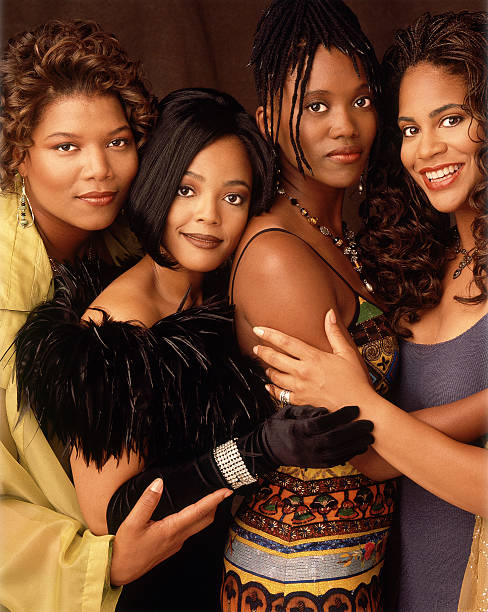By: Sahra Mohamed
When we think about television’s most iconic shows in the late 90’s to 2000’s, Friends, Sex and the City, Will & Grace, or Malcolm in the Middle might come to mind. These series were celebrated, critically acclaimed, showered with awards, and their cast members were compensated with record-breaking salaries. The six main actors of Friends, famously negotiated a $1 million per episode salary in their final seasons. Sarah Jessica Parker, who starred in Sex and the City, not only won 2 Emmys and 6 Golden Globes but reportedly made $3.2 million per episode in the final seasons as an executive producer. Yet, when looking at their Black counterparts, shows like Living Single, Girlfriends, Martin, and My Wife and Kids, it becomes clear that despite their cultural impact and loyal fan base, they never received the same level of recognition or compensation. Why has it taken so long for Black TV shows and creatives to be acknowledged on the same level?
The erasure of Black creativity in Hollywood is well-documented, but one of the most notable examples is Living Single and Friends. Living Single, created by Yvette Lee Bowser and starring Queen Latifah, Kim Coles, Erika Alexander, Kim Fields, and others, debuted in 1993 and became a beloved sitcom about a group of young Black professionals navigating life and love in New York City. A year later, Friends premiered on NBC with an almost identical premise. In a 2016 interview on The Late Late Show with James Corden, Queen Latifah discussed the similarities between Living Single and Friends. She mentioned that Warren Littlefield, the president of NBC at the time, had expressed interest in Living Single, and shortly thereafter, Friends was developed. You can watch the interview here.
Friends became an instant hit series, but Living Single, despite its cultural impact, never received the same financial backing, nor did its cast receive the same level of recognition. In fact, not a single actor from Living Single ever received an Emmy nomination. The awards disparity extends beyond just Living Single. Consider Girlfriends, the 2000s sitcom starring Tracee Ellis Ross, Golden Brooks, Jill Marie Jones, and Persia White, which ran for eight seasons and was one of UPN’s and later The CW’s most successful shows. While Sex and the City, a show centered on four White women navigating friendships, careers, and relationships, racked up multiple Emmy wins and nominations, Girlfriends received zero Emmy nominations in any major acting or series categories throughout its run, despite being submitted for Emmy consideration. Tracee Ellis Ross did not receive her first Emmy nomination until Black-ish in 2016, making her the first Black woman nominated for Outstanding Lead Actress in a Comedy Series in 30 years, since The Cosby Show’s Phylicia Rashad in 1986.
When we think of iconic shows like Martin, starring Martin Lawrence and Tisha Campbell, a ratings powerhouse in the 1990s, Tisha Campbell, who delivered one of the most memorable and comedic performances as Gina Waters, was never nominated for an Emmy. In a revealing interview, Campbell shared that she wanted to be submitted for Emmy consideration but was advised against it by her publicist, who rejected the idea and told her that as a Black woman, she stood little chance. Despite her immense popularity and critical acclaim, her talent was overlooked, and she later starred in My Wife and Kids, where she once again displayed impeccable comedic timing and range, yet still faced the same industry treatment. It wasn’t until the success of Black-ish that Emmy history was made. Anthony Anderson and Tracee Ellis Ross both received nominations for their performances, and yet, despite multiple nominations over the years, Black-ish never won a major Emmy for its cast. This reveals a pattern of Black creatives being recognized but not rewarded. Even the widely beloved show Insecure, created by and starring Issa Rae, failed to win in any major Emmy category, despite its cultural impact. Sterling K. Brown made history in 2017, when he became the first Black actor in nearly 20 years to win Outstanding Lead Actor in a Drama Series at the Emmys for This is Us. Andre Braughter won this category back in 1998 for his performance in Homicide: Life on the Street, highlighting how few Black actors have broken through the awards barrier. While representation in Hollywood has improved, the disparities in recognition, pay, and opportunities for Black TV shows remain.
When Abbott Elementary debuted in 2021, it was an instant hit series. Yet, Quinta Brunson’s win for Best Comedy Writing was only the second time a Black woman had won in that category, with Lena Waite being the first in 2017 for her work on Master of None. Before Sheryl Lee Ralph’s historic win in 2022 for Best Supporting Actress in a Comedy Series, the last Black woman to win this category was Jackée Harry in 1987 for her role as Sandra Clark on the NBC sitcom 227. While the Emmys and Golden Globes are seen as the pinnacle of television awards, the NAACP Image Awards hold just as much importance. For decades, they’ve been a platform where Black talent is recognized for its excellence, celebrating achievements often overlooked by mainstream awards. The NAACP Image Awards have honored icons like Cicely Tyson, Diahann Carroll, and Samuel L. Jackson, showing that Black creativity deserves recognition, even when Hollywood doesn’t always give it.
So, why does the industry still struggle to acknowledge Black television? If talent and cultural impact are the standards, why are Black TV shows often ignored when it comes to awards and pay? The way shows like Living Single were treated is not just a thing of the past—it’s still a problem today. Recently, the fan-favorite TV show Harlem, starring Meagan Good and Whoopi Goldberg, wrapped its third season in 2024. Despite its praise for humor, heart, and its portrayal of Black women’s experiences in New York City, the third season had only 6 episodes, leaving many fans disappointed. Though the show developed a dedicated following, it did not receive the same recognition or opportunities as other mainstream series. The struggles of Black actors, even veterans, further highlight the disparities in Hollywood. Academy Award Nominee, Taraji P. Henson, a powerhouse actress with a career spanning decades, has spoken out about not being paid what she’s worth. Despite her talent and contributions, she’s faced barriers when it comes to fair compensation. Meagan Good, who has also built an impressive career, has praised Tyler Perry for being one of the few directors who paid her what she deserved. Until Black creatives are celebrated and compensated equally, the industry has a long way to go in achieving real equity in television.



Leave a Reply